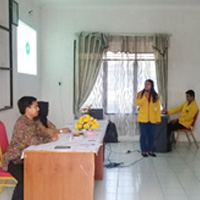Sosialisasi Bank Sampah di Kelurahan Umban Sari Kecamatan Rumbai Kota Pekanbaru
DOI:
https://doi.org/10.14421/jbs.1739Keywords:
Sampah, bank sampah, masyarakatAbstract
Dengan luas wilayah yang dimiliki oleh Kelurahan Umban Sari yang terdiri dari 13 RW dan lebih dari 40 RT maka ini menjadi lokasi yang sangat padat dan juga menghasilkan sampah yang juga tinggi. Alhasil sampah juga bertebaran dipinggir jalan, seperti sampah plastik dan sejenisnya, memang terdapat penjemputan oleh kendaraan kebersihan yang dilakukan oleh dinas lingkungan hidup kota pekanbaru tetapi itu tidak maksimal karena mengingat luasnya wilayah Umban Sari. Untuk itu perlu penanganan khusus agar sampah ini bisa ditangani dengan serius, langkah awal yang dilakukan adalah membentuk unit bank sampah di kelurahan umban sari, kedepan akan dikembangkan menjadi bank sampah mandiri Kelurahan Umban Sari.
[With an area owned by the Umban Sari Village which consists of 13 RWs and more than 40 RTs, this is a very dense location and also produces high levels of waste. As a result, rubbish is also scattered alongside the road, such as plastic waste and the like, there is indeed pickup by cleaning vehicles carried out by the environmental service city of Pekanbaru but that is not optimal because given the vast area of Umban Sari. For this reason, special handling needs to be taken so that this garbage can be handled seriously, the initial step taken is to form a garbage bank unit in the umban sari village, in the future it will be developed into an independent garbage bank in Umban Sari Village.]
References
Hoornweg, D., & Bhada-Tata, P. (2012). What a waste: a global review of solid waste management.
McDougall, F. R., White, P. R., Franke, M., & Hindle, P. (2008). Integrated solid waste management: a life cycle inventory. John Wiley & Sons.
Ogwueleka, T. (2009). Municipal solid waste characteristics and management in Nigeria.
Putra, Windu. 2008. Perekonomian Indonesia dalam beberapa teori ekonomi pembangunan Indonesia. Raja Grafindo. Depok.
Sims, J. T., & Wolf, D. C. (1994). Poultry waste management: Agricultural and environmental issues. In Advances in agronomy (Vol. 52, pp. 1-83). Academic Press.
Sumodiningrat, Gunawan., Ari Wulandari. 2015. Menuju Ekonomi Berdikari Pemberdayaan UMKM dengan Konsep OPOP-OVOP-OVOC. Media Pressindo. Yogyakarta.
Widayat, Prama. 2017. Perekonomian Indonesia. CV Karya Nova. Pekanbaru
Wilson, D. C. (2007). Development drivers for waste management. Waste Management & Research, 25(3), 198-207.
Wilson, D. C., Velis, C., & Cheeseman, C. (2006). Role of informal sector recycling in waste management in developing countries. Habitat international, 30(4), 797-808.
http://health-living93.blogspot.com/2015/06/cara-memanfaatkan-bungkus-minyak-goreng.html, akses 14 Feb 2019
https://www.ummi-online.com/cara-memanfaatkan-bungkus-minyak-goreng-untuk-polybag-tanaman-simak-selengkapnyai%C2%BD/, akses 14 Feb 2019
https://g8penyuluhan2016.wordpress.com/, 14 Feb 2019
http://suryamalang.tribunnews.com/2018/05/08/ibu-ibu-bingung-memanfaatkan-jlantah-atau-limbah-minyak-goreng, akses 14 Feb 2019
https://www.rumahmesin.com/daur-ulang-botol-plastik/, akses 14 Feb 2019
http://mediaindonesia.com/read/detail/150170-manfaatkan-sampah-plastik-jadi-barang-bermanfaat, akses 14 Feb 2019
https://nasional.kompas.com/read/2012/06/06/08375930/Mengolah.Sampah.Plastik.Jadi.Suvenir.Cantik, akses 14 Feb 2019
https://jurnal.umk.ac.id/index.php/simet/article/view/1772, akses 14 feb 2019
https://www.rumahzakat.org/plastik-bekas-minyak-goreng-bisa-jadi-pollybag-di-kebun-bunga-rumah-zakat/, akses 14 feb 2019
http://www.bebeja.com/pot-bungkus-minyak-goreng/, akses 14 Feb 2019

Downloads
Published
Issue
Section
License
Authors who publish with this journal agree to the following terms:
- Authors retain copyright and grant the journal right of first publication with the work simultaneously licensed under a Creative Commons Attribution-NonCommercial-ShareAlike 4.0 International (CC BY-NC-SA 4.0) that allows others to share the work with an acknowledgement of the work's authorship and initial publication in this journal.
- Authors are able to enter into separate, additional contractual arrangements for the non-exclusive distribution of the journal's published version of the work (e.g., post it to an institutional repository or publish it in a book), with an acknowledgement of its initial publication in this journal.
- Authors are permitted and encouraged to post their work online (e.g., in institutional repositories or on their website) prior to and during the submission process, as it can lead to productive exchanges, as well as earlier and greater citation of published work.





